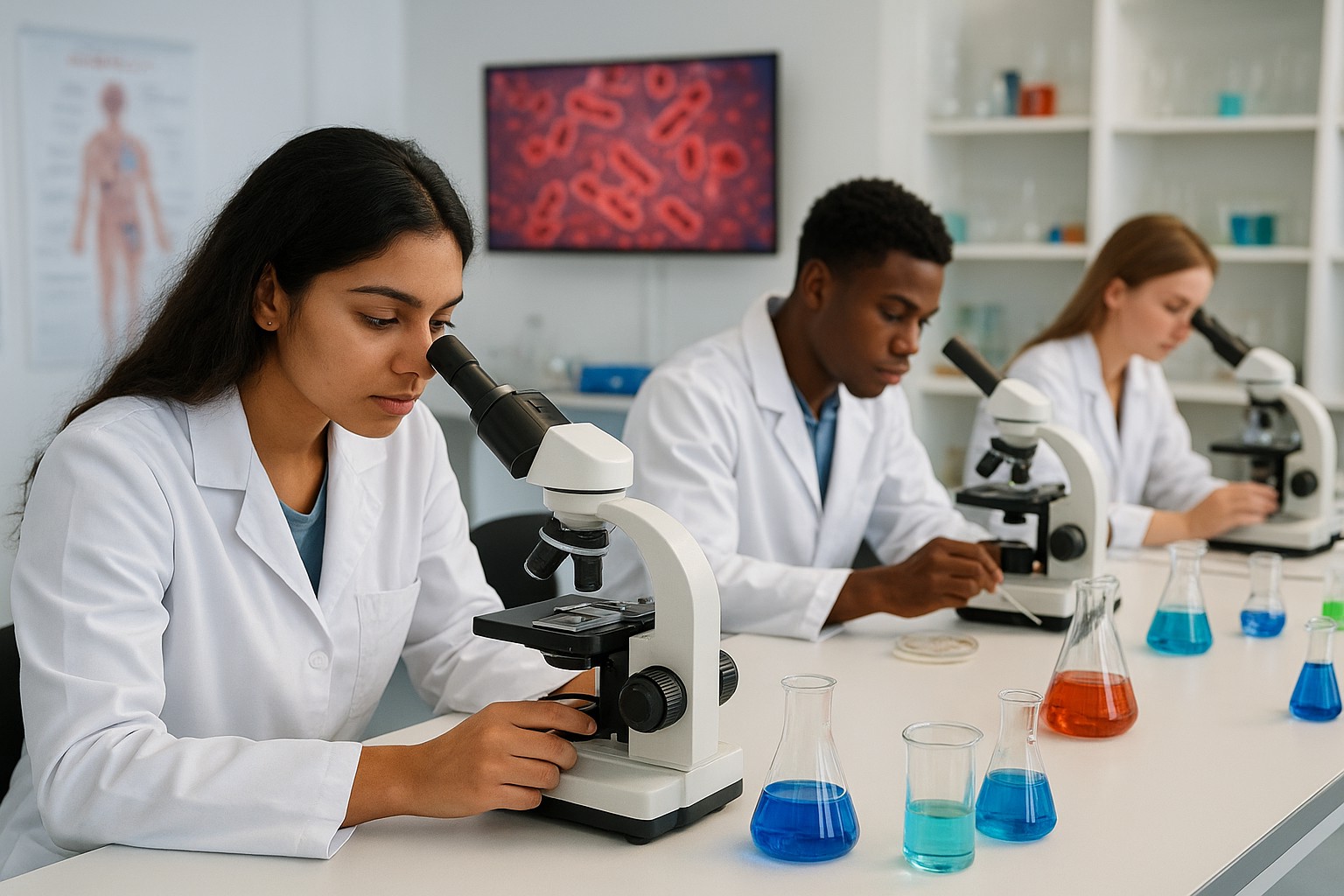What are the subjects of a BSc in microbiology?
Microbiology is a truly captivating branch of the life sciences, a field dedicated to exploring the unseen world of microorganisms—a vast and diverse group encompassing bacteria, viruses, fungi, and protozoa. These tiny entities, invisible to the naked eye, exert a monumental impact on nearly every aspect of our existence, from human health and disease to industrial processes and the delicate balance of our environment. From brewing beer and making bread to developing life-saving antibiotics and cleaning up oil spills, microbes are at the heart of countless natural and engineered systems.
A Bachelor of Science (BSc in Microbiology) is a dynamic undergraduate program meticulously designed to combine rigorous theoretical study with extensive practical training.
Are you curious about the microscopic universe and eager to contribute to scientific innovation? This article provides a full breakdown of the core subjects, enriching electives, and indispensable laboratory components that shape this fascinating BSc program. Discover how a degree in Microbiology can be your gateway to a rewarding scientific future.
What Subjects Are Included in a BSc in Microbiology?
A BSc in Microbiology typically follows a three-year or four-year curriculum structure, depending on the country and university.
The BSc Microbiology syllabus is usually broad, offering a balanced mix of:
Core Biological Sciences: Providing the essential context for understanding life at a cellular and molecular level.
Chemistry: Fundamental for comprehending biochemical processes within microorganisms.
Applied Microbiology: Focusing on how microbial knowledge is used in real-world contexts.
Here's an example of some common BSc Microbiology subjects you will encounter:
General Microbiology: An introductory course covering the history, classification, structure, function, and general biology of various microorganisms.
Cell Biology: The study of cell structure, organelles, and their functions, common to all living organisms, including microbes.
Biochemistry: Focuses on the chemical processes and substances that occur within living organisms, like metabolism and enzyme function.
Immunology: Explores the immune system—how the body recognizes and defends itself against pathogens.
Molecular Biology: Delves into the molecular basis of biological activity, including DNA, RNA, and protein synthesis.
Genetics: The study of heredity and the variation of inherited characteristics, crucial for understanding microbial evolution and genetic engineering.
Environmental Microbiology: Examines the roles of microorganisms in natural environments, including nutrient cycling, bioremediation, and ecosystems.
Microbial Physiology: Focuses on the life processes of microorganisms, including their growth, metabolism, and responses to environmental conditions.
What Core Courses Are Required in Microbiology?
The Microbiology course overview emphasizes foundational courses, especially in the first two years, which are designed to build a strong scientific base before students delve into more advanced and specialized topics.
These foundational courses typically include:
Introduction to Microorganisms: This is often one of the first courses, familiarizing students with the diverse world of microbes, their characteristics, and their importance.
Microbial Diversity and Taxonomy: Students learn how to classify, identify, and differentiate between various groups of bacteria, archaea, fungi, protists, and viruses.
Microbial Genetics and Evolution: Explores how genetic material is structured, replicated, and transferred in microbes, as well as the mechanisms driving their evolution and adaptation.
Biostatistics and Bioinformatics: Increasingly vital, these courses teach students how to analyze biological data using statistical methods and computational tools, essential for modern research.
These core subjects are not just theoretical; they are integrated with practical applications through experiments and research assignments. This approach ensures that students can connect abstract concepts to tangible scientific processes, preparing them for the complexities of advanced study and real-world scientific inquiry.
Do BSc Microbiology Programs Include Lab Work?
Yes, lab sessions are an absolutely critical part of any BSc in Microbiology program. Microbiology is fundamentally an experimental science, and hands-on experience is indispensable for developing the practical skills required in research, diagnostics, and industry.
Students will spend a significant amount of time in laboratories, performing a wide array of activities:
Culturing and Identifying Bacteria: Learning sterile techniques, growing various microbial cultures, and using microscopes and biochemical tests to identify different species.
Testing Antimicrobial Resistance: Performing sensitivity tests to determine how effective antibiotics are against specific bacteria, a crucial skill in healthcare.
Analyzing Enzymes and DNA Samples: Techniques such as gel electrophoresis, PCR (Polymerase Chain Reaction), and spectrophotometry to study microbial genetics and biochemistry.
Sterilization and Aseptic Technique Training: Mastering methods to prevent contamination, which is paramount in microbiology labs and many related industries.
This extensive practical exposure helps students bridge the gap between scientific concepts and their application.
What Electives Can Students Choose in Microbiology?
As students progress into their later years, BSc Microbiology programs often offer a range of electives. These optional courses allow students to customize their degree based on their evolving career interests or specific postgraduate goals, leading to specialization within the vast field of microbiology.
Popular electives often reflect key application areas:
Medical Microbiology: Focuses on human pathogens, infectious diseases, epidemiology, diagnosis, and treatment.
Ideal for those interested in healthcare and public health. Industrial Microbiology: Explores the use of microorganisms in industrial processes like fermentation (for food, beverages, biofuels), enzyme production, and bioremediation. Suited for careers in biotechnology and manufacturing.
Food and Dairy Microbiology: Deals with microbes in food production, spoilage, preservation, and ensuring food safety.
Relevant for the food industry and quality control. Environmental and Agricultural Microbiology: Examines the role of microbes in soil fertility, plant health, nutrient cycling, waste treatment, and bioremediation of pollutants. Great for environmental science and sustainable agriculture.
Virology: A specialized study of viruses, their structure, replication, pathogenesis, and methods of control.
Mycology: The study of fungi, including their roles in disease, food production, and ecosystems.
Choosing electives strategically allows students to deepen their expertise in a particular niche, making them more attractive to specific employers or for specialized Master’s and PhD programs.
How Do Microbiology Subjects Prepare Students for Careers?
The rigorous curriculum and hands-on training in a BSc in Microbiology equip graduates with a powerful skill set, preparing them for diverse and impactful careers after BSc Microbiology.
Immunology skills are vital for careers in Healthcare and Diagnostics, including roles in clinical laboratories, vaccine development, and infectious disease research.
Molecular Biology and Genetics form the bedrock for careers in Research and Biotechnology, such as gene therapy, genetic engineering, bioinformatics, and developing new diagnostic tools.
Industrial Microbiology prepares students for the Pharmaceuticals and Fermentation Industry, where they can work in quality control, process development, antibiotic production, and brewing.
Environmental Microbiology leads to roles in Environmental Consulting, Bioremediation, and Waste Management, addressing issues like pollution control and sustainable agriculture.
Beyond specific subject knowledge, the lab-based training in microbiology significantly enhances employability. Students develop critical skills in experimental design, data collection, analysis, and interpretation, which are highly valued in research roles, laboratory management, and quality assurance.
Sample Year-Wise Course Outline Table
| Year | Core Subjects | Key Lab/Practical Courses |
| Year 1 | Introduction to Microbiology, Cell Biology, Biochemistry, Basic Chemistry | Basic Microscopy, Culture Techniques, Staining Methods, Sterilization |
| Year 2 | Molecular Biology, Genetics, Immunology, Microbial Physiology, Biostatistics | DNA Extraction, PCR, Enzyme Assays, Immunological Tests, Spectrophotometry |
| Year 3 | Industrial Microbiology, Medical Microbiology, Environmental Microbiology, Advanced Genetics/Virology (Electives) | Fermentation Techniques, Microbial Analysis (food/water), Antimicrobial Susceptibility Testing, Bioinformatics Tools |
FAQ Section
Q1: Is math required for a BSc in Microbiology?
Yes, a basic understanding of mathematics is required, especially statistics.
Q2: How much lab work is included in the course?
Lab work is a substantial and critical component of a BSc in Microbiology.
Q3: Can I pursue biotechnology or genetics after a microbiology degree?
Absolutely. A BSc in Microbiology provides a very strong foundation for further studies or careers in biotechnology and genetics. The molecular biology, genetics, and biochemistry courses are directly transferable, and many graduates pursue Master's or PhDs in these related fields.
Q4: What are the best career options after completing a BSc in Microbiology?
Some of the best career options after BSc Microbiology include:
Clinical Microbiologist/Lab Technician: In hospitals and diagnostic labs.
Research Scientist/Assistant: In universities, government labs, or pharmaceutical companies.
Quality Control/Assurance: In food, pharmaceutical, and biotech industries.
Biotechnologist: Developing new products or processes.
Environmental Microbiologist: In waste management, bioremediation, or public health.
Food Safety Specialist: Ensuring the safety of food products.
Q5: Which universities offer top-rated microbiology programs?
Many universities globally offer excellent microbiology programs.
University of California, Berkeley (USA)
Harvard University (USA)
University of Cambridge (UK)
ETH Zurich (Switzerland)
University of Toronto (Canada)
Australian National University (Australia)Always research specific department rankings and faculty research interests.
Conclusion
A BSc in Microbiology offers an exhilarating journey into the unseen world that sustains and challenges all life on Earth. It is an excellent foundation for scientific and healthcare careers, providing a unique perspective on biological processes and their real-world implications.
The comprehensive mix of theoretical knowledge, critical lab skills, and specialized electives meticulously equips graduates to become vital contributors to research, industry, and innovation.













MicrobeMaven
on October 12, 2025This breakdown of BSc Microbiology subjects is fantastic! It clearly shows the balance between foundational sciences like Biochemistry and specialized areas like Immunology. #BScMicrobiologySubjects